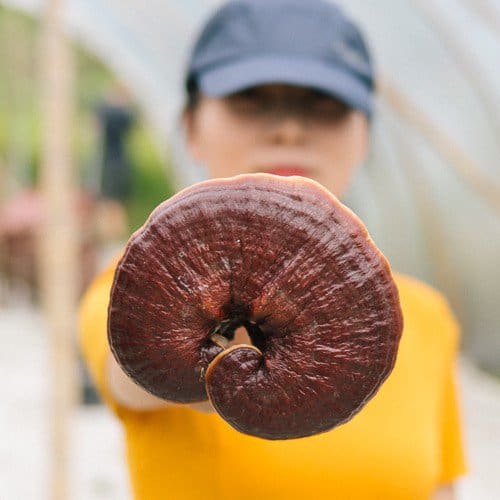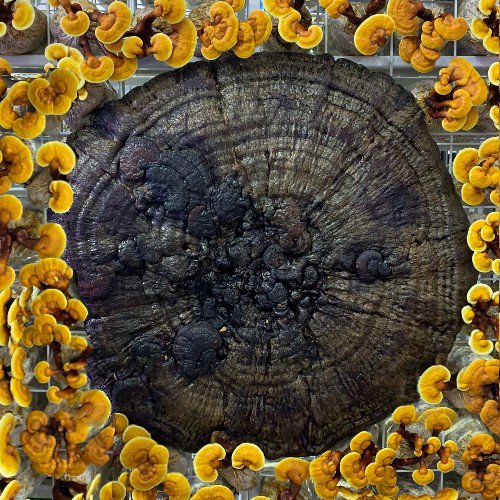Your cart is currently empty
Reishi mushroom has long been considered a potent immune modulation mushroom contain beta-glucans as well as uniquely bitter triterpenes like ganoderic acids. All organically grown and extracted to increase the bioavailability of the beneficial compounds.
The Longevity Mushroom!
Reishi is a type of polypore: a woody type of mushroom that grows from trees and whose underside is smooth and composed of thousands of tiny pores, rather than gills. Polypores are also called bracket mushrooms or shelf mushrooms because of the way they sprout horizontally from trees.
It may surprise you to know that the term “reishi mushroom” doesn’t actually refer to one specific type of fungi. Reishi (also known as Lingzhi in China and Korea and “mannetake” in Japan) is simply the common name for the scientific genus of mushroom, Ganoderma.
The Ganoderma genus of mushrooms is found all over the world, and from the study of the mushrooms’ various properties, estimates suggest there could be as many as 2,000 separate species (1). The world’s most common reishi species is Ganoderma lucidum —lucidum is Latin for “shiny,” which refers to the varnished appearance of the mushroom’s surface. The most commonly used Ganoderma species in mushroom supplements are also Ganoderma lucidum (3).
The storied reishi mushroom benefits for the mind and body were first discovered in Asia and its medicinal use can be traced back thousands of years. Among the wide variety of fungi used in traditional and herbal medicine, the reishi mushroom has one of the most varied and long-ranging histories. Excitingly, modern science confirms that the reverence for this fungus and its healing properties is well-founded.

Reishi is a type of polypore: a woody type of mushroom that grows from trees and whose underside is smooth and composed of thousands of tiny pores, rather than gills. Polypores are also called bracket mushrooms or shelf mushrooms because of the way they sprout horizontally from trees.
It may surprise you to know that the term “reishi mushroom” doesn’t actually refer to one specific type of fungi. Reishi (also known as Lingzhi in China and Korea and “mannetake” in Japan) is simply the common name for the scientific genus of mushroom, Ganoderma.
The Ganoderma genus of mushrooms is found all over the world, and from the study of the mushrooms’ various properties, estimates suggest there could be as many as 2,000 separate species (1). The world’s most common reishi species is Ganoderma lucidum —lucidum is Latin for “shiny,” which refers to the varnished appearance of the mushroom’s surface. The most commonly used Ganoderma species in mushroom supplements are also Ganoderma lucidum (3).

Documented references to reishi’s reputation as a health booster date back as far as 2,400 years, and depictions of it frequently appear in ancient Chinese and Japanese artwork. However, the mushroom has likely been in use as a medicinal herb for over 4,000 years across the Eastern hemisphere, including both Korean and Indian cultures (15).
Ancient Chinese herbalists called reishi Lingzhi (灵芝) because it means “herb of spiritual potency.” Traditional Chinese Medicine (TCM) practitioners prescribe Lingzhi to influence the heart, lungs, liver, and kidney channels, to balance Qi (the body’s life force), calm the mind, and relieve cough and asthma. These practitioners called reishi “the mushroom of immortality” to describe the all-encompassing health support that this mushroom reishi could provide (2).
Using modern research techniques, scientists have determined that reishi mushroom benefits for supporting longevity and wellness are indeed abundant. This fungus contains over 400 different bioactive compounds including triterpenoids, polysaccharides, nucleotides, sterols, steroids, fatty acids, proteins, peptides, and trace elements (3).they contain hundreds of bioactive compounds, mainly in the form of polysaccharides and triterpenes, that assist the body in numerous ways (2).
The bioactive compounds in the reishi mushroom provide support to bodily systems that help them function at their best on a cellular level. It is one of the world’s most popular adaptogens because it helps the body and mind adapt fluidly to health stressors and maintain allostasis. Allostatis is the process of maintaining homeostasis through the adaptive change of the body’s internal environment to meet existing and anticipated demands (38).
While this fungus may not be able to grant “immortality” as believed in ancient times, modern research undertaken by scientists has confirmed a myriad of reishi mushroom benefits that can help contribute to a long and healthy life.
Product carousel items